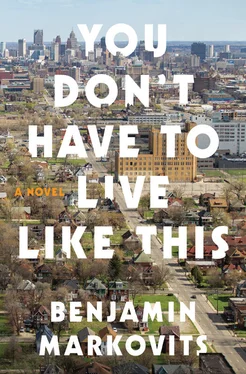A few weeks after I dropped them off, she was raped coming out of a nightclub on Woodward Avenue. She had gone to this club with Ernst to hear a new DJ, who mixed a lot of Motown in with other things, techno and more contemporary music. At one point she went outside by herself for a smoke. This was a couple of weeks before the Michigan ban, and the dance floor was full of smokers, but she wanted a breath of fresh air along with the cigarette. My guess is she had also had a fight with Ernst, though she didn’t mention it. It was very late and the street was deserted; the bouncer had gone inside. While she was standing there, a young man came out of the glare of a street lamp and asked her for a smoke. He was dressed in clean new jeans and unlaced work boots; he had recently had a haircut. He was black. She took out her packet and reached it towards him and he grabbed her hand and started pulling her along.
“I was drunk, too,” she said. “Not sick-drunk but enough to be confused. Also, it was still very cold, there was still snow on the ground, not much, and I was wearing only a small dress. At first when I went outside I thought how nice and cool it was, after the hot club, but when he gave me a shock, I felt suddenly very cold and shaky.”
Woodward runs through a small park and he dragged her towards it. Even though it was two or three in the morning there were still a few people coming out of the restaurants and clubs. But nobody helped her and for some reason she wasn’t screaming. She thought he might have a gun. She tried to explain to him that she didn’t have any money, her boyfriend had her wallet and he was back at the club. “He’ll give you whatever you want,” she said. When they got to the park, he pushed her down behind a tree next to some bushes; the ground was very hard and also a little wet. When he lay down on top of her (he felt very strong and heavy), he said, “Fuck, it’s too cold for this shit,” and pulled her back up.
There’s not much around there except tall commercial buildings, with shop fronts on the ground floor and offices above, but a few blocks from the park he found a row of parked cars and broke into one of them. They had to cross several large streets, almost as wide as highways, to get there, and even though it was very early, there was still some traffic. By this point she had started screaming. He held her around the waist with his arm and had also grabbed her other hand as if she were drunk and needed support. He had large hands with long fingers and smelled strongly of cigarettes and aftershave or alcohol. But everybody was in cars and no one heard her; at least, no one stopped.
Inside the car, he spent about a minute getting it to start. When she tried to open the passenger-side door, he struck her very hard on the mouth, breaking a tooth so that her mouth filled with blood, which she spat onto the floor. This is one of the ways they eventually identified the stolen car. Then they drove for about ten minutes, she has no idea in what direction, until they came to a dark street with several vacant lots on it, a few run-down houses and a medium-size apartment block. They went into the apartment block and he pulled her up a flight of stairs — she had stopped using her legs, and the next day, apart from everything else, she found her shins and knees covered in dark bruises.
He said, “Let’s just hope my sister ain’t here,” as he beat on one of the apartment doors and then kicked it in. She doesn’t remember much about the apartment. All the lights were off and he took her through a couple of dark rooms and then pushed her onto a bed, where he raped her, pinning her arms against the mattress with his elbows. She didn’t resist him. When she woke up or came to she heard a woman saying, “What you have to break down the door for.”
“You wasn’t here.”
“How’d you get here.”
“Some car.”
“What you doing now?”
“I’m a drive it away.”
“Don’t leave your ho with me.”
“She ain’t no ho.”
“I ain’t cleaning up after your white hos.”
“She ain’t no ho.”
“What you doing now?”
“I told you. Taking the car.”
And then he left. Eventually the woman came into the room Astrid was lying in.
“Well,” she said. “What do you expect me to do with you?”
“I want to go home.”
“You should a thought of that before.”
“Please,” Astrid said. “I don’t have anything.” She had left her purse in the stolen car.
His sister hadn’t switched on any lights, but the curtains were open, and light came into the room from a street lamp outside. She had a mannish face, with very short hair; she looked yellower than her brother, who was very dark. Older, too. “Fuck this,” she said. “Where you live?”
“I’m staying with friends in Royal Oak.”
“No way I’m driving you out there.”
Astrid said, “I’m very scared. You’re a woman, too. I don’t know what to do.”
“Don’t mess around with no niggers,” the woman said. But she drove Astrid to the Greyhound bus station downtown. “Come on, get out,” she said, with the motor running. “I don’t expect you wanna see any of us again.”
At least the station had a waiting room, with lights on, and a few people sitting around. But for the first few minutes Astrid sat on the bench outside, in spite of the cold. She wasn’t yet ready to say anything to anybody. The station is about a block from the Lodge Freeway, which runs under Howard Street. By this point it was almost five in the morning, and the early commuter traffic made a continuous roar, which echoed off the bridge and surrounded her with noise. Dawn was about an hour away.
There was a bathroom inside, though it was very dirty. Astrid went inside to clean herself up before calling 911. The dispatcher sent an ambulance and a squad car — they took her first to the hospital and then to her friends in Royal Oak.
At the hospital a policewoman photographed the bruising on her legs and around her thighs. A doctor took several samples, including blood samples, and put her on a complicated course of medication. In the afternoon, she had another visit from the police. She wanted to see the photographs, but they weren’t ready yet. Already the bruises on her legs had begun to change color, and after the policewoman left, she asked Ernst if he would take new photographs of her injuries. He didn’t want to so she took the pictures herself. At first, she was just very anxious, because it seemed to her that her bruises were the only evidence she had, apart from the photographs, that something terrible had been done to her; and she knew that the bruises would go away. But later, as she did in fact begin to heal, and her skin turned yellow and then paler again, she started taking pictures as a way of recording the process, which seemed to her almost beautiful and even moving.
She soon realized, she said, that these photographs were the only actually “artistic” photographs she had ever taken, the only ones with any artistic value . It shouldn’t have surprised me that Astrid was still the pretentious woman who had annoyed me in the car, but even as I sat on the wall outside the party, listening and saying, I’m sorry, I’m sorry, I felt annoyed. I also thought, you tough bitch. But I did feel sorry for her and wanted to kiss her, too, though we didn’t kiss till later, after a few more drinks, when we went back into the party.
Later she asked me to look over the version of the story she had written down. She especially wanted my opinion about the dialogue, if she had gotten right the way black people talk, if it was offensive. I told her I didn’t know any better than she did. Also, I wasn’t there. “But you know what it’s like,” she said. “You remember only what you hear, and you hear only what you expect to hear, which is what prejudice is.”
Читать дальше












